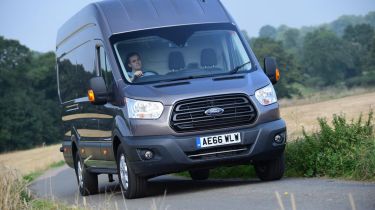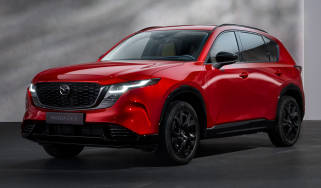Van finance explained: exploring leasing, contract hire and personal loan deals for van buyers
Buying a van on finance is similar in many ways to car finance, although business users do get some benefits from buying a work vehicle
If you're on the lookout for a new van to buy, you'll certainly find plenty of different ways to pay for it. Gone are the days of simply handing over a wad of cash, instead you will now be faced with an array of van finance options and deals designed to tempt you.
Having such a wide variety means that paying for a van is now more complicated than it once was, but this isn’t necessarily a bad thing. Having a range of finance options, many with 0% APR or deposit contributions, makes it easier to purchase your van without needing to save up a small fortune. Perhaps leasing could even be an option, allowing you to spread your costs even further. The list of potential options goes on, so it’s actually easier to find a van finance solution to exactly suit your budget and needs than ever.
The challenge is working out which kind of van finance is best for you and your business. Look no further for the answer, because we’ve examined the different van finance options available and rated their pros and cons, to help you choose the right sort of finance deal for your business.
Van finance options explained
Cash
- Pros: Simple transaction, no complicated finance agreements needed
- Cons: Could be a grey area for tax, you're stuck with the van until you can buy a new one
It's the most traditional and simplest way of buying a new van, but paying cash is no longer necessarily the smartest option. Once you've paid your money, that's it: the van is yours and you can do what you like with it. But owning the van outright means that you are also entirely responsible for its maintenance and upkeep, and this could prove expensive if you cover a lot of miles with your work.
And as time goes on and the vehicle gets older, your van will start to wear out and you'll be the one responsible for its upkeep. If you want your van to be an advert for your business, then rolling around in a clapped-out bucket of bolts certainly won't do the job of wooing potential clients.
Another area for contention is VAT. If you're VAT registered and paying for a van in cash, make sure you get a receipt for the transaction, otherwise the taxman will be asking questions about it and this could spell problems for your business.
Personal loan
- Pros: More secure than cash, freedom of choice from lenders
- Cons: It's just a loan for the vehicle with no perks, your van may be at risk if you don't keep up the repayments
Some buyers will like the simplicity of arranging a loan that sees them paying a deposit, then facing monthly repayments over a set period before becoming the custodian of the van. Van dealers will have preferential finance rates, or you can go straight to the bank or another high street lender and sort your own deal.
With a bank loan, all you’re doing is supplementing the cash payment with extra funds on which interest is payable. The loan will need to be repaid over a set period, although banks will usually offer preferential business rates and useful features such as delayed repayments to help firms with their finances. Again, if you're using this method, then all that will happen is that you'll own the van once you've come to the end of the loan agreement, although if you fail to keep up repayments, there is a risk that your van could be repossessed.
Contract hire
- Pros: Fixed payments with no balloon payment at the end, a new van every year or so
- Cons: Large initial payment, you won't own the van
There are plenty of tempting offers when it comes to contract hire, all of which are designed to get you behind the wheel of a better van for less. The set-up is similar to a conventional loan and repayment scheme, but you won't own the van at any time.
However, van dealers will offer plenty of incentives to get you on board. Firstly, maintenance of the van will probably be included in the deal, or you could pay a few pounds extra per month to get it included. These deals will have flexible lengths and mileage caps to suit you, and that means you could maintain a professional appearance to prospective customers by replacing your van with a new one every couple of years.
Some companies will offer discounted signwriting rates for businesses that use the vehicle to advertise their wares. And, should the van breakdown or be off the road, the lease deal should have 24-hour breakdown assistance included to help keep your business moving.
The downside to contract hire is that it's essentially an extended rental contract. That means you won't own the van at any time, but then, if you consider a van to be a cost rather than an asset, then this is a far better use of your capital than buying a vehicle outright.
Lease purchase
- Pros: Low costs, flexible contract lengths and mileage terms
- Cons: You're tied to one manufacturer, potential issues with mileage limits, large payments at the start and end of the agreement
A lease purchase agreement is similar to contract hire, but it gives you the option of owning the van at the end of the arrangement. You pay a large initial deposit, but then the monthly repayments should be reasonable. You'll have another large sum to pay at the end of the contract, although the van will then be yours to do with as you please.
However, in some cases you can also use your existing van to pay for the deposit on a new vehicle, which should help to keep the initial outlay of your next van purchase at a reasonable level.
Annual Investment Allowance
If you're a small business, another factor to consider when buying a new van is your Annual Investment Allowance (AIA). HM Revenue and Customs requires you to pay tax on any profits that you make, but you can deduct the value of any investments you have made in the tax year before HMRC can take their cut. At the moment, the AIA limit is £200,000, and vans are included in this allowance, but cars are not.
With this in mind, it might be tempting to buy a van outright and offset the cost against your AIA. But you can put the monthly payments of a van lease towards your AIA, too, so you could offset the cost of the van across a few years of AIA, rather than just lumping it into the first year. That means you can use more of your allowance to go towards other tools and equipment that qualifies for AIA.
Do bear in mind that not all finance agreements qualify for the AIA, speak to your accountant for details on whether you can offset your van's costs against this.
Get all the latest van news and reviews on the Auto Express van channel...
Find a car with the experts










